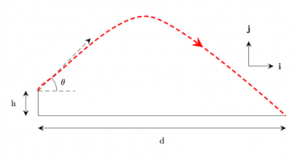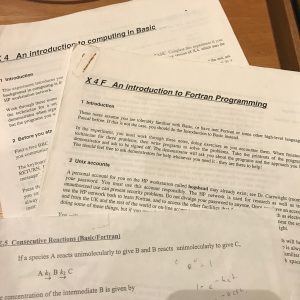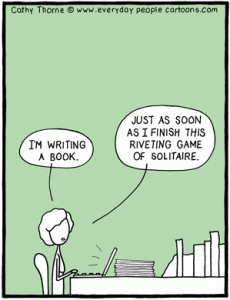After the lack of focus I’d had studying for M208, I was adamant that with MST210 I’d get into a routine and stay on top of the work regardless of what else life through at me. This worked pretty well in October and November. I did the work during my commutes, approximately 3-4 hours a day, even if I had to sit on the floor of a train carriage or find a dusty corner of Paddington while waiting for a delayed train. All was going well. At the end of November I began the process of changing jobs and, because of the nature of my work, was put on garden leave for three months. Suddenly I wasn’t confined on trains for about one seventh of every weekday. This is where my whole routine broke down. Continue reading MST210 – Lack of routine has consequences
Review: What If? Serious scientific answers to absurd hypothetical questions

It’s been a while since I read a physical book. Most of my reading these days is done on the kindle and, while I still have physical text books for my maths degree, I have a lot of books just waiting to be read. What If? by xkcd creator Randall Munroe is one of these. I was given this as a present a few years ago and, despite my initial excitement (having been a reader of xkcd since about comic 17212) the book had sat on my bedside table under the kindle but just above the half-read “Sagas of the Icelanders” that I’d bought on my honeymoon. Last week I picked it up and started reading. I read just under half in that first sitting and then two days later finished it. I wish I’d read it the day it was given to me. Continue reading Review: What If? Serious scientific answers to absurd hypothetical questions
Diagrams with LaTeX – easier than you might think

I’ve written before about the power of literate programming, using to create reports when code runs. It’s fairly simple to combine this with the graphical drawing packages to create impressive graphs and figures on the fly. A lot of academics I’ve spoken to have shied away from using
for drawing, despite being very proficient with the textual layout. Similarly, a lot of students on the OU Mathematics degree write up all of their assignments in
but drop in hand drawn graphs and diagrams. Just like anything else in
, once you get your head around how it works, it’s actually not that difficult to create very complex structures. Continue reading Diagrams with LaTeX – easier than you might think
WiDS2017: Women in Data Science Reading
 Yesterday I had the great pleasure in being part of the global WiDS2017 event show casing women in all aspects of data science. The main conference was held at Stanford but over 75 locations world wide had rebroadcasts and local events, of which Reading was one. In addition to spending a great evening with some amazing women, I was asked to speak in the career panel on my experiences and overall journey. Continue reading WiDS2017: Women in Data Science Reading
Yesterday I had the great pleasure in being part of the global WiDS2017 event show casing women in all aspects of data science. The main conference was held at Stanford but over 75 locations world wide had rebroadcasts and local events, of which Reading was one. In addition to spending a great evening with some amazing women, I was asked to speak in the career panel on my experiences and overall journey. Continue reading WiDS2017: Women in Data Science Reading
3D Printer Part 23: Setting up, troubleshooting and the unexpected
At the end of my last post in this series, we had completed the build. This post focuses on installation of the software and updating the firmware ready to print, from issues 65 and 76 of 3D Create and Print by Eaglemoss Technology. If you’ve skipped a part of this series you can start from the beginning, including details of the Vector 3 printer I’m building on my 3D printer page.
If you haven’t already done so, download the correct V3 software from the V3 website. While you’re there, also get the updated firmware for the Arduino board that powers the V3. Continue reading 3D Printer Part 23: Setting up, troubleshooting and the unexpected
Learning Fortran – a blast from the past

Over the weekend, I was clearing out some old paperwork and I found the notes from one of the assessed practical sessions at University. Although I was studying biochemistry, an understanding of basic programming was essential, with many extra optional uncredited courses available. It was a simple chemical reactions task and we could use BASIC or Fortran to code the solution. I’d been coding in BASIC since I was a child1 so decided to go for the Fortran option as what’s the point in doing something easy…. Continue reading Learning Fortran – a blast from the past
Creative writing – harder than it looks

As a child I wrote a lot of stories. I think my English teachers were disappointed that I chose a Science route rather than literature. However, just like art, creative writing is something I’ve continued to pursue throughout my technical career (when I’ve felt creative enough!). I wrote a novel during my PhD that I’ve not yet revisited to see if it’s worth publishing1 and have always jumped at opportunities to write articles and blog posts about the things that interest me. However, I have had one idea for a book bubbling in my mind for the last twenty years and I have never really had the time to focus on it properly. Continue reading Creative writing – harder than it looks
Writing for other websites
 Towards the end of 2016, I didn’t post as much content as I usually like to on here. While there are all the usual excuses of free time, the main reason was that a lot of the ideas I had were being written for other websites. So here’s a collection of my posts from the last few months of last year that didn’t make it on here. Continue reading Writing for other websites
Towards the end of 2016, I didn’t post as much content as I usually like to on here. While there are all the usual excuses of free time, the main reason was that a lot of the ideas I had were being written for other websites. So here’s a collection of my posts from the last few months of last year that didn’t make it on here. Continue reading Writing for other websites
Debate the idea, don’t attack the person
Over the past few days, my social media timeline has been full of angry people, predominantly in the UK and predominantly attacking people of note within the UK1. This is, sadly, nothing new. However I have noticed a further decline in the quality of debate, perpetuated by the strong emotions of what has happened in the world. People whose opinions I respect and who normally make reasoned arguments have posted some pretty vile language that is literally “[person] is a [expletive]” in regard to Brexit, the NHS, Southern Rail and a whole host of regional issues. If this was directed at someone with whom they agreed, then there would be, legitimately, outrage. Name calling someone is never a valid argument. Didn’t we all grow out of this at school? Apparently not. Continue reading Debate the idea, don’t attack the person
Review: Microsoft Sculpt Ergonmic Keyboard

Anyone who has to sit near me in an open office for any length of time usually comments on the punishment that I tend to give keyboards. I type (both general text and code) very quickly. When my fingernails are in good condition (i.e. I haven’t spent the weekend with power tools) this fast typing can make a sound like heavy hail on a conservatory roof. I’ve worn out keyboards before with one work laptop having to use ascii codes every time I needed to type s, n, j or i1 until a replacement arrived. It’s not that I’m a heavy typer, just that I do a lot of it, especially as a hands on manager over the years, I’ve had to write reports, documentation and code, so I’ve learned to be very, very fast at it. Continue reading Review: Microsoft Sculpt Ergonmic Keyboard